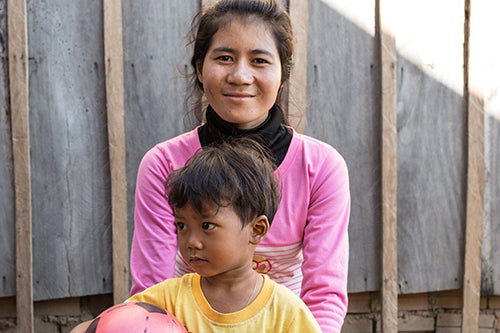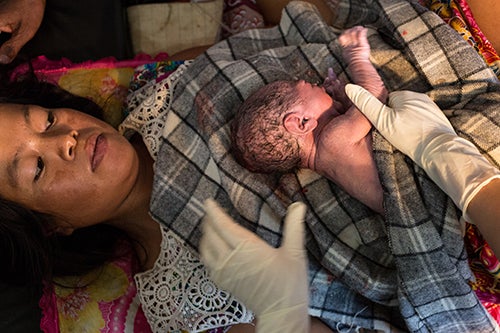News
In Cambodia, family planning offers a path away from poverty
- 16 September 2015
News
![]() The 70th session of the United Nations General Assembly is currently underway in New York. This meeting of the world's leaders will see the adoption of a new set of global goals – the Sustainable Development Goals – that aim to transform the world over the next 15 years. Goal 3 calls for ensuring universal access to sexual and reproductive health-care services, including family planning.
The 70th session of the United Nations General Assembly is currently underway in New York. This meeting of the world's leaders will see the adoption of a new set of global goals – the Sustainable Development Goals – that aim to transform the world over the next 15 years. Goal 3 calls for ensuring universal access to sexual and reproductive health-care services, including family planning.
KRATIE, Cambodia – “My parents had many children, and they couldn’t afford to send us to school,” said So Pumngea, 24, in Cambodia’s rural Kratie Province. “Before, families had to stay poor.” But today, Ms. So has a powerful tool to help her break free of the cycle of poverty: family planning.
When Ms. So was pregnant several years ago, she visited a midwife. In addition to providing antenatal care and safely delivering the baby, the midwife also explained that family planning could help Ms. So choose the number of her children and the spacing of their births.
“I knew about birth spacing from seeing ads on TV, but I didn’t really understand what my options were,” Ms. So said.

With the midwife’s help, Ms. So chose to use an intrauterine device, a long-lasting form of contraception. She and her husband have decided that one child – their son, Panith – is enough for now.
Ms. So sees a direct relationship between the size of her family and their future prospects.
“If I were to have many children, it would cost us a lot of money for health care and school fees. I want my son to go to university, and if we had more children we would not even be able to afford high school. My husband didn’t go to high school, and because of this he has to do a very difficult job for not much money.”
Her parents were initially wary of her decision to not have a large family. But she explained: “If I have the money for education, my son could become a doctor and won’t have to cut wood in the forest like my husband. This will improve the situation of my whole family.”
The promise of a better life for their grandson, now four years old, has helped change their minds.
“Now that they understand this, everyone supports me completely,” Ms. So said.

Midwives, like the one who delivered Panith, are playing a key role in educating women about their options.She is not alone. Many young women in Cambodia are embracing the benefits of family planning. According to local data, unmet need for contraception in Cambodia fell dramatically between 2000 and 2010.
UNFPA and the Government of Cambodia are helping to train and deploy midwives in areas where they are most needed, including rural communities where information about reproductive health is limited and family planning is often misunderstood.
“Old people in Cambodia are afraid of pills and injections, and avoid coming to the hospital,” said Chanduong Rotha, a senior midwife at the Orrusei Health Center in Kratie. “If someone who is using contraception gets sick with a common illness like the flu, they [circulate] rumours that family planning is to blame.”
But this is changing as Cambodian women increasingly look to midwives for care and information. “Women are [already] coming to midwives for birth advice,” Ms. Chanduong said. “Because of our training, and the fact that women are more comfortable talking to us than male doctors, we are ideal for spreading this information.”
During her 21 years as a midwife, she has seen first-hand how attitudes have changed. “During the last 10 years, there has been a big difference in both usage and acceptance [of family planning],” she noted.
As views about family planning change, so do women's expectations for themselves, their families and their futures.
“The new generation is different,” Ms. Chanduong added.